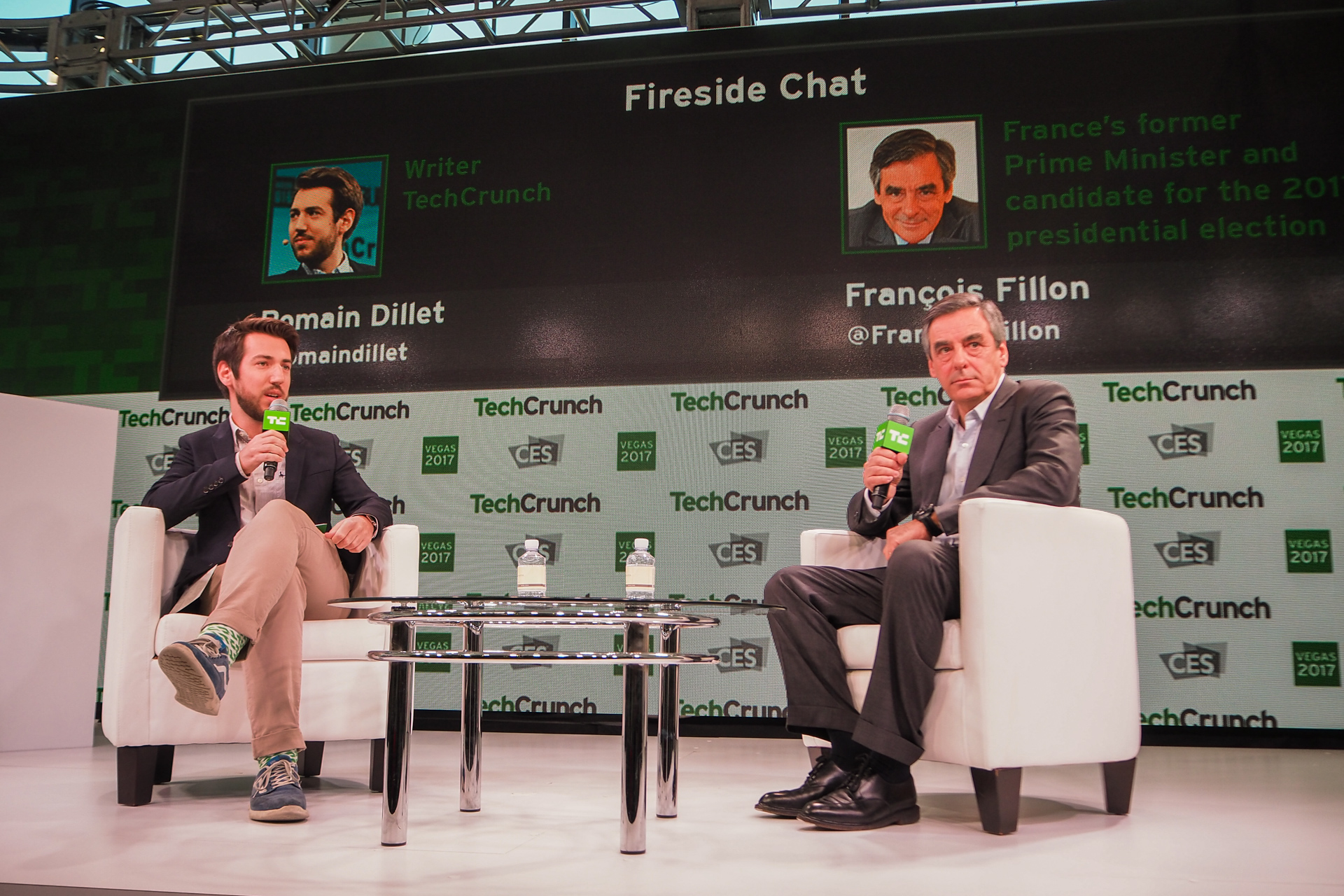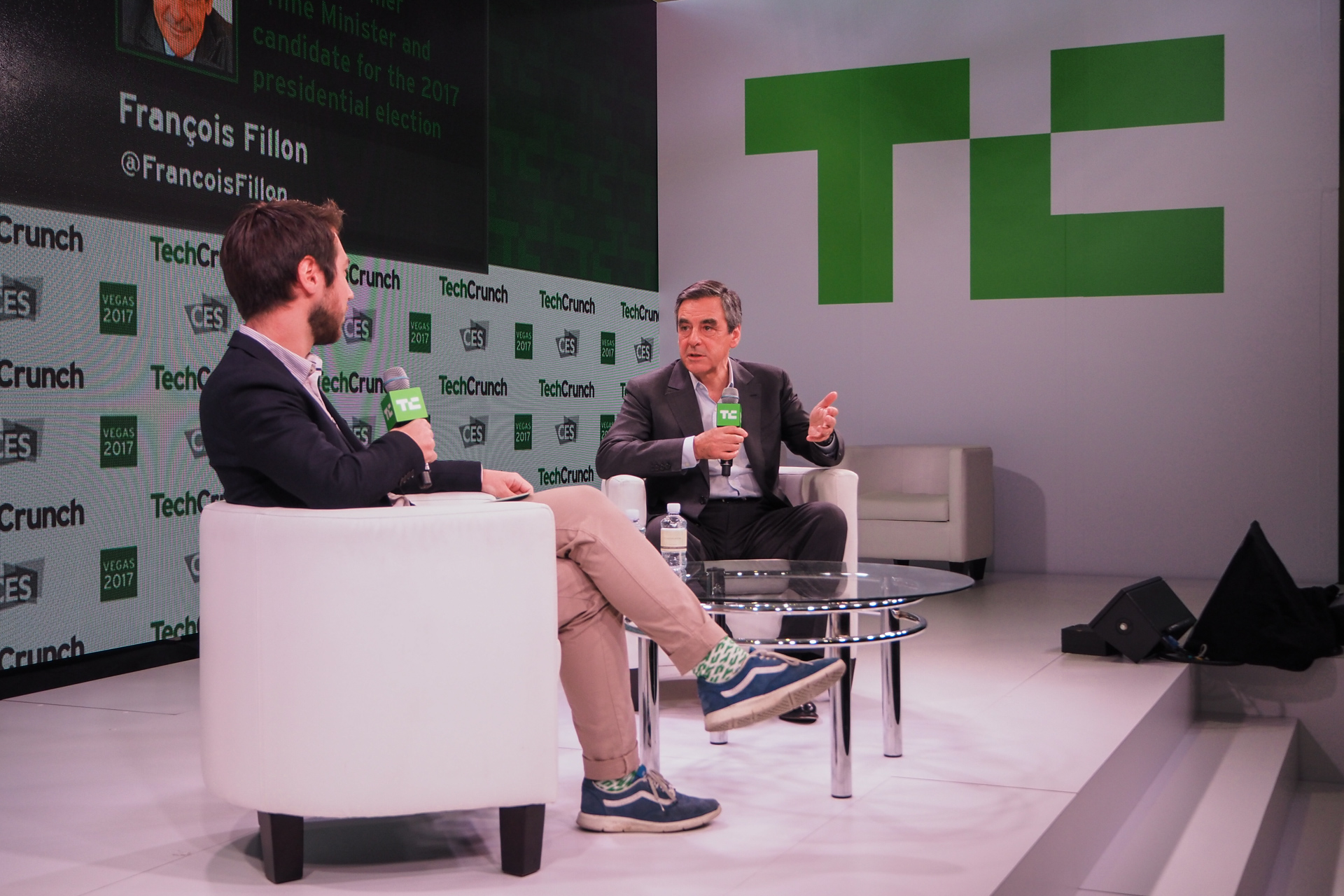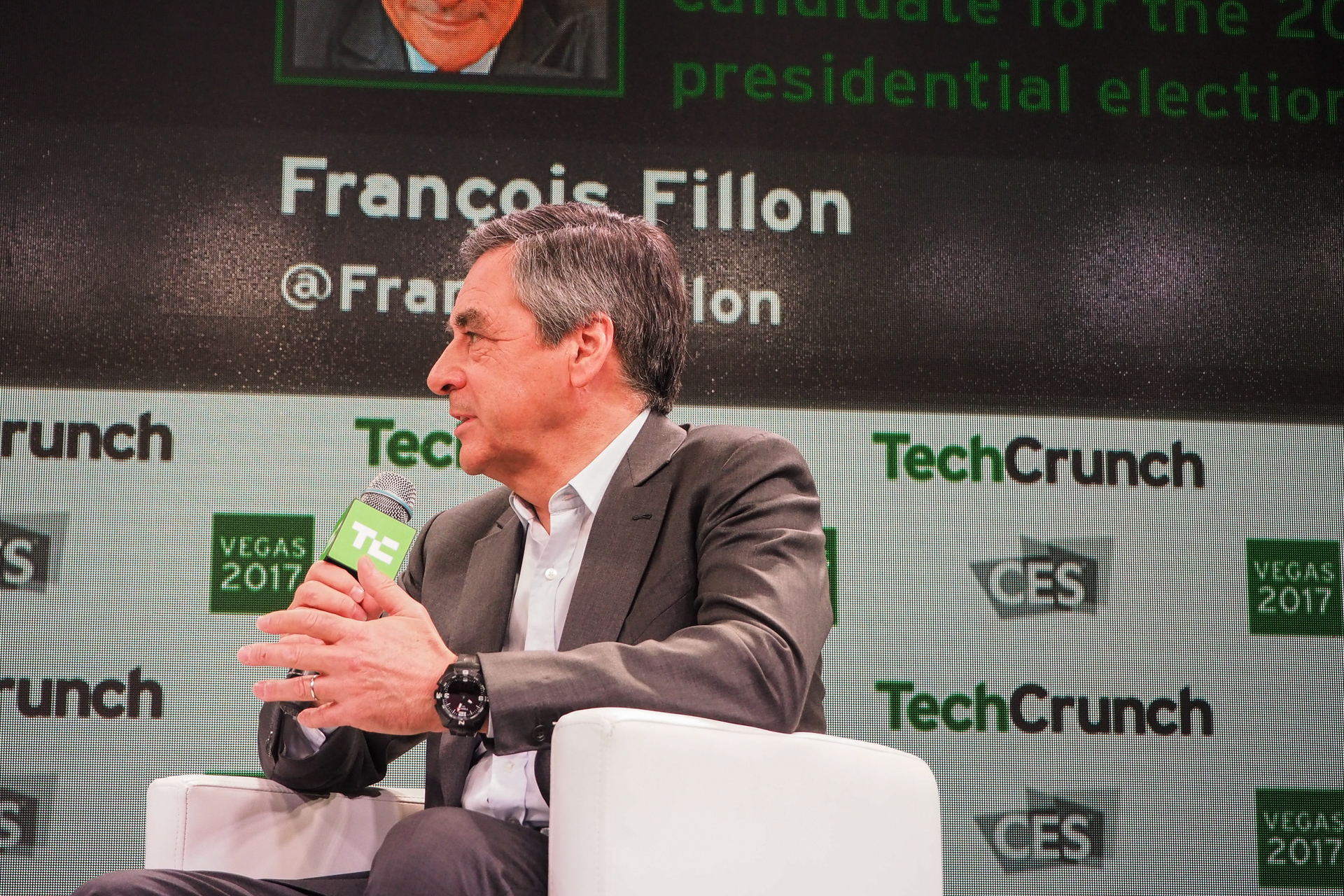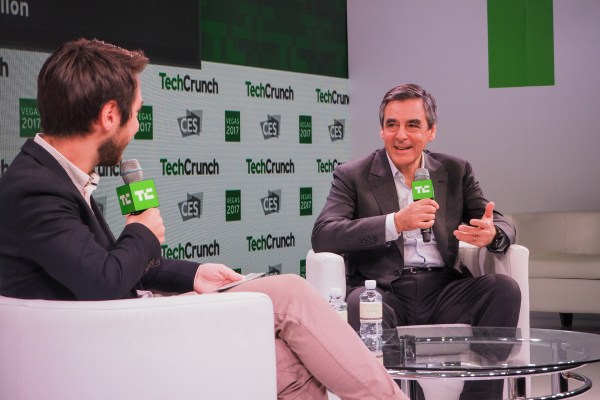Every CES, there are more and more French startups. At this point, it would make sense to move CES to Paris or at least New York so that thousands of French people don’t have to fly all the way to Las Vegas.
French startups also attract French politicians. And that’s why France’s former Prime Minister and current presidential candidate François Fillon was there, trying to prove that he understands French startups.
François Fillon was Prime Minister from 2007 to 2012 when Nicolas Sarkozy was France’s President. After 2012, he has been pretty quiet for a few years, preparing for the 2017 presidential election. Last Fall, against all odds, he won the primary election for the conservative party ahead of Nicolas Sarkozy and front-runner Alain Juppé.
He’s now the official candidate for the main conservative party in France and also happens to be leading in the polls as current president François Hollande and his party are extremely unpopular. So there’s a good chance that Fillon is going to become France’s next president and that he’s going to have a huge impact on the startup ecosystem in France and Europe.
I got the chance to interview him on the TechCrunch stage earlier this month at CES in Las Vegas. You can watch the interview in French right here or read the full interview in English below.
TechCrunch: François Fillon, thank you for accepting our invitation. I think I’m not alone in this case, but a few days ago, when I learned that you were coming to CES, I was very surprised. Do you have a message for the startup community?
François Fillon: Of course I have a message to say to the startup community. The first message I want to say is that the digital revolution is for me the key when it comes to growth and France remaining a major economic power in the world. And the second message I want to say is that there is no hope, there is no future for French startups in a country with 6 million unemployed people, 57 percent of public expenditure and the world record of taxes. So of course the digital revolution is essential, but it can only take off if we fix the foundation, foster a healthy economy. And this is the message I want to say here, but especially for the election in France.
TC: We will talk about technical issues in a minute, but before that, I’m sure many of us would like to know if you’re a geek, a true geek. Do you use Uber for instance?
FF: Of course I use Uber. I use it naturally only when I am outside France.
TC: In France you have a driver I guess?
FF: Exactly.
TC: Perhaps you use Deliveroo to order meals?
FF: I use Deliveroo, I order my books on Amazon, I order my computers on the Apple Store.
TC: And maybe some carpooling on BlaBlaCar?
FF: No, Not yet… That’s for my children.
TC: Yesterday we saw you walking around CES, I’m sure you met a lot of entrepreneurs, some of them are probably right here. What are some of the startups that you liked?
FF: First, I was very impressed by all the technological breakthroughs that are going to lead to self-driving cars. And I think it is really— among all the revolutionary products that are showcased here, this is the one that is probably the most important for me when it comes to the impact it’ll have on the economy and on the way our society works. I saw a startup called Sqool, which implemented educational content on dedicated tablets and seemed to be something remarkable.

TC: You are the candidate for the right and center parties. People who vote for the right often expect tax breaks in favor of companies in particular. After all the tax breaks from François Hollande, do you think that you can go even further?
François Hollande’s tax breaks are just a big scam François Fillon
FF: François Hollande’s tax breaks are just a big scam. He increased the taxes when he became president, then he gave a little bit back— sorry but this phrase that you’re using annoys me, “tax breaks.” This is not the issue. The question is how do we help French companies become bigger. And in order to help them grow, we must tax them as much as the main countries we are competing with — at least major European countries. So we shouldn’t be talking about tax breaks. We have to give back some corporate revenue so that they can invest, so that they can develop, so that they can do research. And me, I want to give back more than 60 billion euros to companies — these taxes are now unfairly paid…
TC: How much are we talking about? 3 percentage points of GDP, something like that?
FF: More or less. And this is in addition to what Francois Hollande has done, the CICE, which is a very complicated system, which gives back some of the taxes that companies have already paid. I group everything in one system, and I lower the corporate tax for all companies. Because I think that tax policies should be simple, stable. And the goal is to have the same tax level as our German neighbors or our British neighbors as they are our natural competitors.
TC: You’re talking about simple tax policies, and one of the main elements of your tax policy would be getting rid of the ISF [solidarity tax on wealth]. The ISF is still an important incentive for business angels in France. They invest to lower their ISF. What are you going to do to compensate?
FF: Once again, sorry but it feels like we’re thinking backwards when we hear the question you just asked. We have a system that takes all the money away from companies in France, it is called the ISF. We’re taking as much money as possible from the wealthy, those who can invest in the economy. We have a way to lower your ISF a little by investing in companies. And people tell us now that we shouldn’t get rid of the ISF in order to maintain this system.
If we get rid of the ISF, many French people will have more money to invest in the economy because they will pay less taxes. I would like to add that, in order to have a smooth transition, I would like to set up a policy that is exactly the same as the one in the U.K. This policy makes it possible to deduct investments from the income tax this time — 30 percent of their income tax, up to 1 million euros, for investments in small companies and innovative companies.
TC: Directly on the income tax?
FF: Directly on the income tax.

TC: Let’s switch gear and talk about labor laws. Do you want to make existing labor laws more flexible?
FF: The three important reforms I want to pass during the first 100 days of my five-year term, if the French trust me, are a reform of corporate taxation, a reform of labor laws and a criminal justice reform.
I want to create a self-employed status that works perfectly well for the new economy, people who want to create their own companies François Fillon
When it comes to labor laws, I want to allow companies to negotiate with their staff for working hours, without any limit at 35 hours — that is unique in our country compared to all our competitors. Even more important, I want to create a self-employed status that works perfectly well for the new economy, people who want to create their own companies, in a simple way, and without being restricted by the labor laws. These constraints are very big in our country. So there will be a status reminiscent of what I did when I was Prime Minister — “self-employed entrepreneur.” There will be a status for independent contractors, and these independent contractors will be able to sign contracts with companies. These contracts will last up to three years, and during these three years, it will not be possible to have an administration change them into full-time employments.
TC: And after three years, what happens?
FF: Honestly, a three-year contract with a contractor often leads to a discussion with the company. If a company is working with a contractor for more than three years, it means that the company should hire them.
TC: You might be aware of all the talks around contractors, in particular in the U.S. Uber drivers, Postmates delivery persons… Many consider those jobs as insecure jobs, some courts are trying to turn those jobs into full-time employment contracts. Don’t you think that contractor jobs can also go too far in France?
FF: Of course there’s always a risk and we’ll need to check regularly. But today the main question in France is: how do we fight unemployment? We have 6 million people who do not work. 6 million people, it is both a tragedy for these people, it is a tragedy for the French economy in terms of consumption, in terms of growth. I want to give these people the ability to create their company. In France, I can reassure you, it will never be as unrestricted as in the U.S. There will always be some constraints. As we have done with “self-employed entrepreneurs,” you will be able to create your company with simple rules, and it’ll be safe, especially in terms of legal certainty.
TC: And it was one of the strong topics of Nathalie Kosciusko-Morizet’s campaign.
FF: Yes, it was in my program too.
TC: Most French know you as the former Prime Minister of Nicolas Sarkozy. But I felt like they were rediscovering you today. Do you think that you have what it takes to seduce them in the months to come before the Presidential elections?
FF: I will not try to seduce them, because I do not think politics is a matter of seduction. I will try to convince them — to convince them that the only way to fix the French economy today is to make radical decisions that profoundly change our economic system. France is the country with the lowest working hours and the highest public spending. Even without long studies, you can understand that it cannot last, that it cannot work and that you have to go back to the standard when it comes to working time and public spending. This will foster economic growth.
TC: So that brings me to the question that is going to irritate you. I have seen many ministers come and go, some are more convincing than others. There is one that has been extremely popular in the startup community over the last few years, it’s Emmanuel Macron. Are you at CES to convince voters who will potentially vote for Emmanuel Macron?
FF: First, this question doesn’t annoy me. Competition is a good thing…
TC: That’s democracy.
FF: Emmanuel Macron was almost a member of my team when I was Prime Minister, so he’s certainly very good. I came to CES well before him, because I was here in 1999. I believe I am one of the first politicians who brought French companies to CES. There were companies from the Pays-de-la-Loire region. Now, during the upcoming campaign, we will have to convince voters with our programs and experience. I have some experience as I made it easier for startups and the digital economy. I privatized France Telecom and privatized the telecom industry in France…
TC: In the 1990s, right?
FF: Against Mr. Macron’s friends who didn’t like this idea. I set up the research tax credit as it exists today. It has been a breath of fresh air, particularly for startups. Because without research tax credit, I think many companies would not have grown so much without it.
When I say that we must remove the 35-hour law, we’ll get rid of it François Fillon
So I have a track record, and I’m using this track record to talk to the French. And a program. And my program has something different. I’m not trying to avoid the obstacles. When I say that we must remove the 35-hour law, we’ll get rid of it. I’m not saying that we’re going to put in place a system of varying working hours based on age, if you know what I mean — because that’s what Emmanuel Macron is saying. As for the digital economy, I’m not telling startups that we’re going to create a small special set of laws for startups in the digital economy that are going to be great, but we’re not going to change the 35-hour law, taxes, the number of public jobs, public spending. Everyone sees that there is no future for France without an effort to simplify its economic organization. So it’s the debate that’s going to take place, it’s going to be a stimulating debate. And I’m not too worried about my ability to convince the French.
TC: And when it comes to some of the policies of the current Government, such as La French Tech for example — it’s a Government-backed idea. What’s your view on that, is that something you want to keep?
FF: Yes, of course. There are very good ideas that we should keep. La French Tech is a very nice idea. But I remind everyone that La French Tech without the research tax credit, La French Tech without a number of laws that have been passed a while back to foster startups… There would be no startups. Or at least there would be less. So we should keep all of these things, and naturally we will also keep more recent things that are working well. I have prepared my digital program with about 40 startups and with a lot of professionals. And by listening to them, I have built with them a program that meets the demand of men and women who want to develop their companies in the digital industry.
TC: Can you name a few startups that are supporting you?
FF: We’ll give you the list, but it’s hard to name 40 names. But we’ll give you the list.

TC: In 2016, there were Brexit, the election of Donald Trump, Marine Le Pen is doing rather well in the polls for the Presidential election. It feels like anti-immigration feelings are taking over Western countries. What is your migration policy? This is likely to be a key issue during the presidential campaign, and what is your position on that?
FF: This will be an essential topic. Europeans want more security, and particularly in France. There have been extremely violent attacks for some years now. And Europe must get together to fight a threat, which I name very precisely. I name it Islamic totalitarianism. That is to say, there is a new form of totalitarianism which is posing a threat to the peace of the world, not for France or Europe alone, but for the peace of the world.
TC: Those are some violent words…
FF: It’s reality. In life, you have to name things properly. If we are not able to name things… for example, talking about terrorism is a simplification. Terrorism is a way to act. But behind those terrorist attacks, there is a political project that is the result of extremists. It’s not Muslims in general, it’s Muslim extremists who want to establish a totalitarian state. And this totalitarian state, they try to establish it from Pakistan to Nigeria. there is a very strong unrest in Pakistan. Afghanistan, in spite of almost 10 years of war, is not far from falling back into the hands of the Talibans. Multiple regions have fallen into the hands of the Talibans. Syria has been destabilized, Iraq has been destabilized, Lebanon is threatened, Yemen is at war, Libya is in a situation of disorder… This phenomenon spreads across the Sahel in West Africa.
So if those are strong words, those strong words describe a reality. And that’s why we need a European political response, a security response, a defense response, immigration control… We must comply with human rights, democratic values, the values of democratic European societies. But we must resist and defend ourselves.
TC: Concretely, what’s going to happen for those who are living in France with a residence permit? What’s going to happen to entrepreneurs who want to hire foreign engineers?
FF: Nothing’s going to happen, they’ll still be allowed to live there.
TC: You’re only going to negotiate with other European countries?
It won’t change anything for the recruitment of the executives you need, the people you need François Fillon
FF: No, it is a matter of regulating migratory flows. What does it mean? It means deciding on the number of people who get a visa and the jobs that we want to emphasize. It is called a migration policy. Canada has a migration policy, the U.S. has a migration policy, and the U.K. has a migration policy. So we will try to have a migration policy. Until now, we never really had a migration policy… we didn’t build one.
It won’t change anything for the recruitment of the executives you need, the people you need. But something needs to change — we need to secure our European borders. When you come here to the U.S., you spend two hours at the airport in the security line. When you come back to Europe, it’s a little different.
TC: It’s a bit annoying that you have to spend two hours at the airport, no?
FF: That’s the case in the U.S., right? This is what I experience every time I come here.
TC: Ah, you don’t have a special line for…?
FF: Not when I come on holiday.
TC: One last question because we have very little time left. You mentioned it a bit, but I would like to get further details on that. If you are elected in 2017, will you be the President of startups or the President of big public companies?
Opposing big companies and small companies is an absurd idea François Fillon
FF: Neither. I want to be the President of the French economy that succeeds. I want to be the President of startups, I want to be the President who helps startups become big companies. And, in some cases, I want to be the President who allows big companies to become large public groups.
Opposing big companies and small companies is an absurd idea. France is the European country with the largest number of global leaders among European countries. We will not apologize. In France, I know that sometimes it is trendy to say that big companies are evil.
When I was Prime Minister, there was always a difficult moment in the year — when Total releases their earnings. It is so unfortunate that Total earns money that nobody knows how to communicate about it. This isn’t what I think. I’m very happy that Total makes money.
TC: How do we change the mindsets?
FF I want Total to invest in startups. I want Total to help them grow. And this is what’s lacking in France today. On the one hand, there are big global companies that don’t have too many problems to grow, because they’re above the French national market and its rules. And there are startups that are great. The middle steps are missing. Startups should be able to grow and succeed in France. So they need money. That’s why we need lower taxes. They need more flexible labor laws. And then, they need to find their market. And a country with a growing economy will create this market.
TC: François Fillon thank you very much for accepting our interview.
